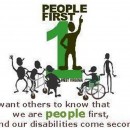Sex Reassignment, Hormones, and Health (1991)
The theme of the first issue of AEGIS’ Chrysalis Quarterly Journal was transsexualism and disability. This was the lead article.
Read MoreBeginning Year Number Nine in Chronic 1A (1987)
I used to want to ask Johnson how to control things, how to control even my arms and legs, but he would have only laughed. Johnson is convinced I’ve gone the same place as Hewlitt, that we have both surpassed the need for our bodies, that if he is dedicated enough he might someday be like us. Besides, he would have said, had I been able to ask, how was he to know I wasn’t a spy, sitting immobile in my wheelchair for eight years in order to trick him into revealing his methods?
Read MoreComputer-Assisted Instruction for the Special Education Teacher (1985)
One of the most surprising findings about CAI is that it is not the brightest students who benefit most from it, but rather the below-average pupil who stands to benefit more
Read MoreTraining Paraprofessionals to Make Data-Based Training Strategy Decisions (1986)
A number of studies have shown teachers can be successfully trained to collect and analyze data daily using trend and error analysis techniques and to make resulting educational decisions that lead to improved student performance. Effects have tended to be positive across a variety of academic tasks and a variety of handicapping conditions, as well as across a range of educators and a variety of settings. However, the use of data-based instructional decision-making has not been widespread.
Read MoreGeneralization and Maintenance in Social Skills Research (1991)
The question of generalization and maintenance in applied behavior analysis is considered by most researchers to be one of crucial importance. Although Skinner addressed the issues of generalization (transfer of stimulus control to objects without a history of reinforcing the organism) and maintenance (exhibition of operant response after the discontinuation of the artificial reinforcement schedule) as early as 1938 in his work with nonhuman animals, it was Stokes & Baer (1977) who clearly and concisely brought the importance of these phenomenon to the attention of the behavior analytic community.
Read MoreRecent Research on Computer Assisted Instruction (1986)
While it could perhaps be argued that microcomputers have yet to cause great changes in the fabric of our educational systems, there is little doubt they have caused great changes in the publishing industry. Besides the publication of innumerable books, many popular magazines and scholarly journals have devoted whole issues to microcomputers. And one of the most popular topics is the use of computers in school. Unfortunately, an astonishingly large percentage of computer-related articles in even our most prestigious journals is speculation and opinion— informed speculation and opinion, perhaps, but speculation and opinion nonetheless.
Read MoreInstruction Via Television (1985)
Conclusions about the efficacy of instructional or educational television have been equivocal. This may be due in part to different conceptions of the subject material by different authors; obviously, a closed-circuit lecture and the NOVA or Sesame Street programs are dissimilar. Therefore, what seem to be differences of opinion may sometimes be differences of terminology.
Read MoreComputer-Assisted Instruction and the Handicapped Child (1984)
In 1954, B.F. Skinner published a paper in Harvard Educational Review in which he proposed the use of mechanical educational devices which operated on principles of operant conditioning (Pagliaro, 1983). He called these devices teaching machines, and the instructional method he named programmed Instruction. In the 1950s a number of Programmed Instruction teaching machines were placed in public schools. During the 1960s, computers, which were then large and quite expensive, were used to the same ends.
Read MoreSome Issues of Dual Diagnosis (1986)
Individuals who have been certified as mentally ill and mentally retarded are said to be “dual diagnosed.” Because there is a high rate of mental and emotional illness in retarded persons, there is a considerable population of dually-diagnosed individuals. This paper provides a brief discussion of policy, diagnostic, arid treatment issues of dually-diagnosed individuals.
Read MoreSIX BITS 1983)
I wrote the augmentative communication computer program SIX BITS for a man with normal intelligence and quadraplegia that affected his speech, making it impossible for others to understand him. He used the program for years; earlier he had a Morse-code based device for which parts could no longer be obtained. Staff at his facility trained him to use the program. The VIC would remain on all day.
Read MoreMy Major Area Paper, Vanderbilt University (1994)
This is my major area paper for the Ed.D. at George Peabody College of Vanderbilt University.
Read MoreUsing the TRS‑80 Model 100 Portable Computer as a Data Collection Device (1985)
BOSCO, The Behavioral Observation System— COmputerized, allows the TRS-8O Model 100 portable computer to be used as a relatively inexpensive data collection device instead of more expensive dedicated devices such as ElectroGeneral’s DATAMYTE and Observational Systems’ OS-3. BOSCO, a program written in BASIC for the Model 100 with expanded memory, has been used to collect real-time behavioral data in field research studies.
Read MoreCollecting and Analyzing Continuous Behavioral Data with the TRS-80 Model 100/102 Portable Laptop Computer (1989)
The behavioral data gathering and analysis program Behavioral Observation System, COmputerized is a program written in the BASIC programming language for the TRS-80 Models 100 and 102 portable computers. I am the sole author. It was used extensively by researchers at the Special Education Department at George Peabody College, which is a part of Vanderbilt University.
Read MoreThe Potential of Microcomputers as Teaching Machines for Individuals with Severe Handicaps (1987)
Although it is hardly possible to predict the exact manner in which microcomputers will change the lives of persons with severe handicaps, it is possible, by considering the unique abilities of these machines, to speculate about ways in which they could be of major benefit. Four characteristics make microcomputers especially suitable tools for working with persons with severe handicaps: programmability, the ability to respond to environmental events, the ability to provide reinforcing consequences for behavior, and the ability to keep detailed and precise records.
Read MorePica: Some Suggestions for Future Research (1987)
Pica is the purposeful ingestion of objects generally considered nonedible. This was one of my papers for qualifying exams.
Read MoreThe Role of Intellectual Assessment at Greene Valley Developmental Center (1980)
Greene Valley is one of the best developmental centers in the world and is the last state-operated developmental center in Tennessee.. It has nevertheless been reduced in size by the state government and will probably soon be closed.
Read MoreThe Chronic Ward (1972)
After lunch the patients gravitate to their chairs, where they sit mutely for the rest of the afternoon. At two p.m. the uniforms will give them cups of applesauce with tan and pink and green pills hidden within. At three p.m. the white uniforms will leave, when replaced by more of the same. The evening shift uniforms are told everything is all right.
Read MoreClark in Three Parts (1991)
In 1991, in the pages of the Stone Mountain Computer Users Group newsletterm I told the story of my work with a physically disabled man I called Clark.
Read MoreUsing a Discrimination Task to Teach Scanning to Severely Physically Impaired Non-Vocal Children (1984)
“All a Board” is an augmentative communication computer program which was designed by the author to allow individuals with very severe physical handicaps to communicate their wants and needs to others, using a single switch. It serves the same purpose as any communication board, but requires much less physical ability.
Read MoreReview of EZ-SCAN (1993)
EZ-SCAN is a memory-resident software program for MS-DOS computers. It enables an individual to access all keyboard functions via a single switch attached to a joystick port. Selections are made by multiple switch entry.
Read MoreTeaching Cooking Skills to a Man With Dual Diagnosis Using Backward Chaining (1993)
To increase his domestic skills, the interdisciplinary team decided at Mr. Packer’s annual habilitation planning meeting that he would have a goal of learning to prepare a meal independently. The time frame for the goal was one year. The house manager was asked to develop the instructional plan.
Read MoreStereotypic Behavior in Persons with Mental Retardation (1994)
In children and adults with mental retardation, and particularly in those who are severely or profoundly impaired, stereotyped behaviors are very common. Special educators do not typically get to watch the origin of these behaviors; rather, they are often confronted with well-developed behaviors which appear to be nonfunctional and can occur with such great frequency as to make training difficult.
Read MoreEuthanasia in Persons with Mental Retardation: More Than in the Wind (1993)
As we approach the Millennium, euthanasia is officially outlawed in the United States (Lusthaus, 1985), but it is a frequent topic in professional and philosophical journals, just as happened in pre-World War II Germany (Wolfensberger, 1981). The Germans “thought the unthinkable” a decade or more before actually beginning to do it. If we are not currently thinking the unthinkable, we have at least been discussing it in our professional journals for the last decade and more.
Read MoreCerebral Palsy (1994)
Cerebral Palsy is the name of a variety of nonprogressive brain defects which occur during the prenatal, perinatal, or early postnatal periods, and which result in motor impairment (What everyone should know about cerebral palsy, 1977). It is not “a disease in any medical sense” (Crothers & Paine, 1988, p. 1), but can arise for any number of reasons. It causes major disability and is associated with a variety of other disabling conditions, including epilepsy, mental retardation, and sensory deficits.
Read MoreThe Use of Microcomputers as Augmentative Communication Devices (1984)
For persons with severe motor impairments which limit their ability to move as well as to speak, computers are of importance as communication aids. However, computer-based communication devices have heretofore been expensive and often crude. The proliferation of reliable, low-cost personal computers has solved the hardware problem, but communication ware is frequently inadequate or inefficient.
Read MoreUsing a Bar Code Reader to Enter Behavioral Observations (1988)
Our impression is that use of a computer-based bar code readeris a suitable method for collecting some types of behavioral data. The necessity of looking away from the keyboard suggests the BCR may be more practical for collection of interval rather than continuous data. The provision of mechanical guides would provide tactile cues for positioning the BCR and might reduce the need to look at the scanning sheet.
Read MoreThe Ability of Mentally Retarded Persons To Judge Facial Expressions From Photographs (1986)
Read MoreUsing a Microcomputer to Collect Behavioral Data on an Augumentative Communication Program (1989)
We added automatic data collection routines to a microcomputer-based augmentatative device which has been used for more than five years by an adult male nonretarded resident of Greene Valley Developmental Center. The data were collected by the computer, without the necessity of a human observer. Data are presented for frequency and length of use, number of switch closures, and accesses of output devices.
Read MoreThe Ability of Mentally Retarded Adults to Judge Facial Expressions From Photographs (1983)
The ability of mentally retarded persons to recognize facial expressions is not well known. In the present study, Carroll Izard’s photo recognition technique was applied to a sample of institutionalized mentally retarded adults, with their responses compared to those of nonretarded adults to determine: 1) if retarded adults can identity emotive facial expressions, and, 2) which expressions they can best recognize.
Read MoreGID In Relation to Handicap and Disability (1993)
Is transsexualism a handicap? If having a handicap means that one of more of one’s life activities are substantially limited, then certainly transsexualism, which can result in estrangement from family, divorce, court-enforced separation from minor children, loss of employment, public humiliation, and general rejection by society, can be a handicap.
Read MoreNormal and Abnormal Stereotyped Behaviors in Humans and Infrahumans (1986)
All vertebrates exhibit rhythmic, repetitive behaviors. Some of these behaviors are normal and functional, but others are abnormal and non-functional. When the behaviors are abnormal, they are called stereotypies. Studies of normal rhythmic behaviors and abnormal stereotypies in both human and non-human animals are discussed. The importance of comparing normal and abnormal rhythmic behaviors in both human and non-human animals is stressed.
Read MoreAugmentative Communication Systems: Suggestions for Improvement of Selection Strategies (1984)
Many persons with a wide variety of disabilities are unable to speak. Those with good physical mobility can learn to effectively use American Sign Language, pencil-and-paper, battery-operated electric typewriters or memowriters, or other communication aids or systems (Silverman, 1980). However, the severely physically involved, non-vocal person— for instance, children with cerebral palsy, stroke victims, and those with degenerative neurological or muscular diseases such as Amyotropic Lateral Sclerosis or Muscular Sclerosis, may lack the voluntary control to use even a lap board with words or symbols drawn on it.
Read MoreCUGA Newsletter (1990-1992)
By the time I moved to Atlanta in 1989 the home computer craze was on the wane. I nonetheless looked up a Commodore users group in DeKalb, my home county: The Commodore Users Group of Atlanta. I remained a member and sometimes board member as we all slowly moved (most of us reluctantly) from our beloved C-64s to Macintoshes and PCs.
Read MoreA Brief Analysis of the Constitutional Right Of the Mentally Retarded To Refuse Psychological Treatment (1985)
For more than a century, mentally retarded individuals have been commonly segregated in residential institutions. Common reasons for placement in such institutions are simple intellectual deficiency and behavioral disturbance. The institutions were originally purely custodial, where “undesirable” individuals were placed so that the sensibilities of other citizens need not be offended by looking at them.
Read MoreSelf-Injurious Behavior In Lesch-Nyhan Syndrome (1985)
Lesch-Nyhan Syndrome is of particular interest because of the clear-cut relationship between a deficiency of a single enzyme and a pathological behavior (self-injurious behavior)
Read MoreGWillie (1984)
GWillie is always telling me what to do. I usually do what he says, because he’s awfully smart. He tells me he “makes suggestions.” “I merely point out socially acceptable alternatives to decisions which may not be in your best interest, Willie. I’m like a big brother.” GWillie is like a brother in a way—a nice brother who is always there when I need him
Read MoreWhat I Found in the Basement (1984)
Mr. Evans said please don’t tell anyone, and tried to give me a one hundred dollar bill, but I wouldn’t take it. And then I was running through the grass of the front lawn, and letting myself in the door of our house. I turned around in the doorway, and took one last look at Mr. Evans’ pleading face. And then I went inside and took a long, hot shower.
Read MoreA Raid on Donahue’s Bread (1990)
MacManus could have targeted any of the others: Saunders, Kinnon, Ayers, Britton, or Halvington. But Saunders was fleet of foot, with a vindictive nature; Kinnon was bread-wise and kept a close guard on his slices; Ayers was on a diet and got no bread at all, and so was on the prowl himself; and Britton and Halvington operated on the buddy system and were mutual body and bread guards. That left only Donahue. It had to be Donahue.
Read MoreI Think of Cindi (1987)
A millipede, seeking relief from the green spray paint insanity, comes inside, where the real insanity is. It bustles over the window ledge, its multitudinous legs working in tandem. All those legs! I wonder if it could spare a pair, What kind of god would give a bug thirty pairs and deny me the use of just one?
Read MoreJust Another Year in Chronic 1A (1988)
We’re on the big goddamned yellow and black school bus, on our way to a “picnic,” which means we’ll stop at a roadside park with three trees and two concrete picnic tables and eat extra krispy recipe Kentucky Fried Chicken, bones and all, and maybe even the plastic sporks, the hungrier of us. Then we will be put back on the bus and driven back to the hospital, where we will disembark and be rolled back to the musty, dusty, and always gloomy buildings, back to the chronic wards.
Read MoreFear and Loathing in Lebanon (1986)
My attorney leaned past me and thrust a copy of Public Law. 94-142 at the Mercedes. “Free and appropriate public education for all handicapped,” he screeched. “In the least restrictive goddamned environment!” It was too much for the Mercedes. The driver slowed and took the Stewart’s Ferry exit. My attorney looked at me. “I think that was the Superintendent of Clover Bottom,” he said.
Read MoreLetter to the Editor of The Human Side (1991)
We recycle whatever we can. Our concession serves more than 150 clients and 30 staff. We have a large garbage can in which we place our aluminum cans. Even though our clients are mentally retarded, they are very conscientious about putting their soft drink cans in the proper place. Some even being aluminum from home.
Read MorePeople First (1981)
Recently, Mr. Bill Parra and Mr. Bill Feltner Nashville, met with the 28 residents who attended the 1980 and 1981 People First conferences and discussed with them the possibility of forming a People First group in this area.
Read MoreWalk a Mile in My Shoes (1982)
Throughout that evening the vans and station wagons trickled back in. They discharged the ride-weary but happy individuals who were eager to try out new ideas, programs, and projects they had seen in operation.
Read MoreA Discussion of Stereotypic Behavior in Normal Infants And Developmentally Delayed Individuals (1985)
This paper defines stereotypic, or rhythmic, behavior. The stereotypies of normally developing infants are discussed and compared with the stereotypies of institutionalized individuals with developmental delays. Animal studies are cited, where relevant.
Read More






















